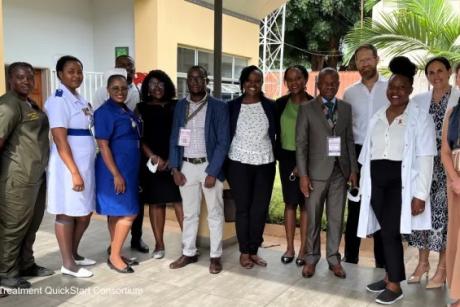
Sara Abdullah at work in at an immunization center in Karachi, Pakistan.
Published October 11, 2018, last updated on October 19, 2018 under Alumni Stories
It was always Sara Abdullah’s intention to return to her home country of Pakistan after completing her global health master’s program at DGHI. It was important to her, she said, because in Pakistan, the field of public health is always overshadowed by the field of medicine, and she wanted to demonstrate the power of public health initiatives.
Abdullah, a 2016 graduate, is already making her mark in Pakistan as a program manager for Interactive Research and Development. In this role, she manages a randomized control trial that is testing the use of conditional cash transfers in improving child immunization coverage in a town in Karachi. We recently caught up with her to see what inspires her, how her work is going and how her DGHI experience prepared her for life after graduate school.
What drew you to global health?
I have always been passionate about health. I was initially convinced that I would become a doctor, but after observing the poor health outcomes of people living in poverty in Pakistan—especially high morbidity and mortality of women in the country—I decided to pursue the path of prevention as opposed to the curative. This brought me to global health. It also helped that I had majored in both economics and biology as an undergraduate at Mount Holyoke College. Global health appeared to be the perfect path to blend both of those disciplines.
What are your global health passions?
Although I identify as a maternal and child health practitioner, I would love to work in women’s health—particularly maternal health. Through my father, a urologist by profession, I got the chance to understand and observe women living with obstetric fistula (a result of prolonged obstructed labor resulting in urinary and/or fecal incontinence). Obstetric fistula is both preventable and treatable, but a lack of awareness combined with a high stigma due to the “reproductive” and “dirty” nature of the problem forces these women to suffer in silence for decades.
I want to play my part in combating these overarching barriers to accessing care within the gender and help establish programs that prevent problems like these in the first place. For my master’s thesis under the guidance of Dr. Melissa Watt, I helped further explore the stigma these women face in Moshi, Tanzania, and now I want to bring all of this knowledge back to the context of Pakistan.
I believe that addressing maternal health would automatically lead to better outcomes in child health—a field requiring much attention. In Pakistan, one child in every eleven dies before their fifth birthday. Immunization coverage is approximately only 59 percent, even though the Expanded Program on Immunization provides free vaccines. The coverage rates are even lower in Sindh province (where I work): official estimates report diphtheria-tetanus-pertussis coverage of 39 percent and fully immunized child coverage of 29 percent.
This poor coverage has a significant impact on child morbidity and mortality; therefore, it is extremely important to improve immunization outcomes. The organization I work for, Interactive Research and Development, was responsible for developing and scaling up the provincial digital immunization registry to enable better tracking and reduce drop-outs. My study is now leveraging this registry to incentivize caregivers to vaccinate their child. The conditional cash transfers, if successful, can allow for an easy scale-up, making this trial even more important.
How did the Master of Science in Global Health program prepare you for your current position?
When I was about to start my graduate program, many people told me that one only does a graduate program for the degree, and true learning only happens once you are on the job. I am happy to say that in my case, it was completely untrue.
When I started working at Interactive Research and Development, I often found myself reaching for my notes (yes, actual class notes!) or contacting my former professors for their lecture slides.
DGHI provided us with a strong foundation for understanding and implementing global health programs. The very nature of my work relies daily on problem solving and research design. It involves dealing with the institutional review board, modifying study instruments and consents and making decisions that ensure any changes do not compromise the integrity of the research or its data. It was my time at DGHI that taught me how to think about these problems as well the consequences of my decisions—sometimes through lectures and sometimes through the discussions we had both in and outside of class.
Obviously, I’m still learning a lot and will continue to learn, but I’m proud of the education that I got at Duke because I utilize it every day.


